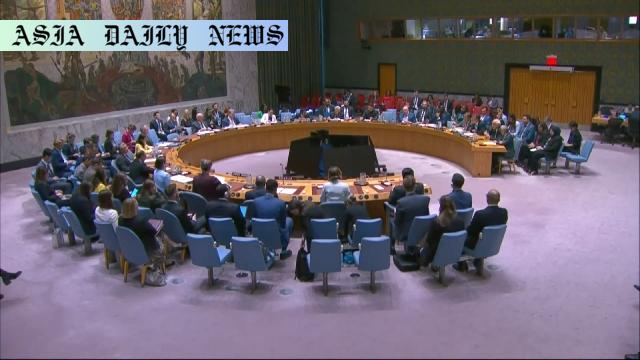Gaza Aid: Participants in a UN Security Council meeting have called for an end to the blockade hampering aid delivery to the Gaza Strip.
Calls for Israel to end its blockade on necessary aid to Gaza dominate the discussion.
Key concerns include famine risks and aid delivery mechanisms.
UN rejects Israel’s military-controlled aid distribution proposal.

UN Security Council Explores Gaza Aid Crisis
At the heart of global discussions, the UN Security Council is grappling with one of today’s most pressing humanitarian crises: the blockade of aid to Gaza. The blockade, which has persisted for more than 10 weeks, has resulted in severe shortages of food, medicines, and other necessary supplies, pushing Gaza’s residents closer to famine with each passing day. During the recent meeting, voices from the council resonated with growing concerns about the escalating human toll and the urgent need for resolution. Tom Fletcher, leading OCHA, provided a grim overview, emphasizing the immediacy of famine risks faced by Gaza’s entire population. International leaders, including British Ambassador Barbara Woodward, stressed the severity of the situation by describing the sight of rotting food lying unused at borders – a stark symbol of both human suffering and political deadlock.
Meanwhile, contrasting perspectives emerged from Israel and its allies. Israeli UN Ambassador Danny Danon highlighted potential misuses of aid, asserting that UN-marked supplies have previously been exploited to ‘feed terrorists.’ He reiterated Israel’s stance on stringent measures ensuring that humanitarian aid does not empower Hamas, rather focusing on its pledge to develop new mechanisms for facilitating aid delivery. This perspective found partial support in Acting US Ambassador Dorothy Shea’s comments, which revealed ongoing US-Israel efforts to create a private aid delivery system. However, those proposals were met with skepticism from global human rights entities and the UN alike. The principle of neutral, impartial, and independent aid remains a foundational doctrine in humanitarian work, and proposals violating it have faced immediate pushback.
Humanitarian Principles vs. Political Tensions
The heart of the debate revolves around how aid is delivered amidst conflict. While some argue a new mechanism is required, others, like the UN, stress adherence to established humanitarian principles. A UN spokesperson strongly opposed Israel’s proposal to route aid via military-controlled hubs, asserting that this violates international codes of neutral assistance delivery. Such disagreements underscore the difficulty of maintaining impartiality in a politically sensitive environment. How to support Gaza’s 2 million residents effectively without entanglement in political or military agendas remains an unanswered question. Nevertheless, the death toll of inaction continues to rise, with children, families, and entire communities suffering as geopolitical debates persist.
Alternative Solutions and Way Forward
To break through the ongoing humanitarian impasse, both short-term fixes and long-term strategies require collaboration. While Israel underscores the importance of ensuring aid does not support hostile activities, the broader international community advocates for tangible, life-saving measures. This situation poses a testing ground for the UN and other aid agencies – one in which neutrality must be defended, but efficiency cannot be sacrificed. Mechanisms like internationally monitored aid routes, supervised local distribution networks, and transparent reporting may offer compromise solutions. Ultimately, success in resolving Gaza’s crisis can only occur if all parties commit to prioritizing human lives over political advantages. Fostering cooperation is paramount, with all stakeholders urged to transcend individual differences for the sake of universal humanitarian values.
Commentary
A Humanitarian Crisis That Demands Action
The ongoing blockade in Gaza serves as a stark reminder of how politics and human suffering often intersect in the most tragic of ways. Families in Gaza, cut off from the most basic necessities required for survival, face desperation that many of us can only imagine. The sight of tonnes of food rotting at borders, unable to reach starving people, paints a grim picture not just of the humanitarian consequences but of the political failures that have fueled this crisis.
One of the most heart-wrenching elements of this situation is its avoidability. Ensuring sustained and efficient aid delivery would not only save lives but could also serve as a bridge toward rebuilding trust. Unfortunately, the standoff between those prioritizing humanitarian neutrality and others emphasizing security concerns creates additional barriers. While legitimate concerns about the misuse of aid must be addressed, these should not come at the expense of people dying from hunger and illness. With transparent mechanisms and international oversight, such challenges can be mitigated without compromising the neutrality of humanitarian assistance.
Global Responsibility and the Call for Neutrality
As global citizens, we must understand the broader implications of this crisis. The principles of impartiality, neutrality, and independence in humanitarian aid are not merely bureaucratic guidelines – they represent a moral commitment to humanity. Violating these principles not only risks prolonging humanitarian crises but compromises the credibility of aid organizations worldwide. The international community must remain united in demanding that these values be upheld, even amidst the most complicated political scenarios. Only through steadfast commitment and compassion can the tide begin to shift for Gaza’s suffering population.


